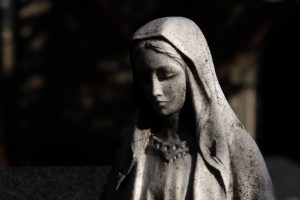Introduction:
Peter Walpot belonged to the Moravian Hutterites, part of the second-generation Anabaptists. The author of the “Five Articles”, one of the earliest systematic statements of Hutterite belief and practice, Walpot was elected to be bishop of the Moravian Hutterites in 1565, before dying of natural causes in 1578. In this piece, we see one of the hallmarks of Anabaptist practice, economic sharing. Economic sharing here is more than simply imitation of the apostolic practice, as seen in Acts 2 and Acts 4, but a spiritual therapy designed to counter the spiritual evils of greed and consumerism.
By holding goods in common, the Hutterites saw themselves in keeping with the traditions not only of the New Testament, but of the Old Testament Jubilee, which “rid their nature of two words—‘mine’ and ‘yours’ (Paragraph 3). Their communal economic practices poses a challenge to economic inequity, not only by condemning wealth, but by elevating common ownership as a genuinely new way of approaching economics which disavowed both absolute private property and the separation of financial ethics from cultivation of the moral life.
“No man can serve two masters; for either he will hate the one and love the other, or he will be devoted to the one and despise the other. You cannot serve God and mammon, (Matt. 6:24; Luke 16:13)”
…meaning earthly property and riches. For the love and care of money governs their hearts like a lock. Therefore you should not say that this applies merely to what is superfluous; do not bring that up! For one thing, Christ says that it is impossible to cling to and serve both of these. Therefore you should not say that it is possible. For if one master commands you to forsake what is yours (Luke 14:33) and the other tells you to draw to yourself or appropriate what is not yours, if the one wants you to live in community and the other to be selfish and possessive, how can these opposites possibly agree? Hence, whoever is a servant of mammon can certainly be no servant of Christ. One must take leave of the one if one would satisfy the other.
No one can go two ways at once; no one can set his foot on more than one spot. No branch can stand on two vines; no one can cook two gruels in one pot. No one who is ill can be healed by both water and fire; one of the two has to go. He who will have the one must let the other go. No one has more than one heart. Thus a man cannot love and serve God and at the same time his own temporal riches, money and possessions, which he calls his master here, in the sense in which Paul calls the belly a god. (Phil. 3:19) For they put their trust in money as if it were God himself and serve it day and night, in the house and in the fields, on land and water, with greatest diligence, with greatest care, and with greatest earnestness, showing not one tenth of such diligence, care, and earnestness when it comes to God and His service. (Luke 18:24) But we are redeemed by Christ (1 Pet. 1:18), therefore we should not serve money and gold and cling to them (Ps. 62:10), but give them over to God’s poor (Matt. 19:21). This prevents us from being cast down to where the rich man was cast and tormented. (Luke 16:19 ff.)
Do not store up for yourselves treasures on earth, where moth and rust consume and where thieves break in and steal, but store up for yourselves treasures in heaven, where neither moth nor rust consumes and where thieves do not dig them up and steal (Matt. 6:19; Luke 12:33), and where they are never snatched away but remain your own. What is here is transitory; it is here today and vanishes tomorrow; today a lovely flower, tomorrow dry dust (1 Pet. 1:24); today a blazing fire, tomorrow burnt-out ashes; a useless shadow (Ps. 144:4), smoke that quickly disappears and goes out by the chimney (Hos. 13:3; Wisd. of Sol. 2:2-5; 5:9; James 4:14)–we cannot hold on to it. When we return, it is all consumed and of no value. Therefore we can achieve nothing with it.
Then Christ adds: “For where your treasure is, there will your heart be also.” For truly, where a man puts his treasure, there he also puts his heart. Therefore the self-seeking man need not pretend so artfully that he can possess treasure and property and yet have his heart and mind with God, for this cannot be. In their words they pretend to be full of ardor, but with their hearts they indulge their own selfishness and greed (Ezek. 33:31) That is their treasure, as may be seen in many who honor, and cling to, what is temporal and earthly to such a degree that, rather than letting go of it, they stoop to beliefs and actions that are worse than the heathen’s, for they have Christ in their mouth, but their heart is in their coffer. Theirs is a terrible idolatry.
Now if one were to say, “What would happen if I relinquished all that is mine and all I own, and why should I do so?” Christ would answer him, “Look at the birds of the air: they neither sow nor reap nor do they have private barns, where each gathers his own store, yet God feeds them. God, the Heavenly Father, who wondrously fed Elijah through the ravens (1 Kings 17:5-6) and the five thousand with five barley loaves (Matt. 14:13-21; John 6:1-13)–how much more will He nourish you! Therefore you should not be anxious. All these are things for the heathen to run after, where each one looks after himself, regardless of what happens to the others. Set your mind on God’s Kingdom and His justice before everything else, and all the rest will come to you as well (Matt. 6:26-34), even though you have no supplies of your own laid by for many days and years like that rich man” (Luke 12:19). In this way Christ wants to lead us back to Adam’s original nobility, before he had care for food and shelter, for care pertains to God (1 Pet. 5:7), while work pertains to us. For this reason community is given: that He may set us free from temporal care and covetousness and we cleave to Him alone and care only for what is divine.
The prayer Christ gave to us, the Our Father, also teaches us to have things in common. Christ does not tell us to pray each for his own bread–not “Give me my bread,” but, “Give us our bread,” meaning communal bread (Matt. 6:9-11; Luke 11:2-3)). They pray falsely who pray, “Give us our bread,” yet when receiving it, count it their own. A property owner has no right to call upon God. The Apostle Paul writes (2 Thess. 3:11-12) that those who live a disorderly life and instead of working are idle busybodies should eat their own bread, as a punishment, that they may feel ashamed.
A man who clings to his property is not honest in the confession of his faith. For the Christian faith posits a holy Christian Church and a community of saints. Now where there is no community of saints, there is no true, genuine Christian Church either. Therefore all who say that community is not necessary and has no doctrinal basis, lie, for it is an article of faith, has been instituted by Christ and the Holy Spirit (Acts 2:44; 4:32) and is His teaching. Hence, just as we have to hold to the apostles’ teaching, to prayer and to the breaking of bread, so we also have to hold to community of goods. For community is no light matter, as though the apostles had undertaken it wantonly; rather, it is God’s earnest will and is as right and fitting now as it was in Jerusalem and elsewhere.
“Enter by the narrow gate,” says Christ, “for the gate is strait and the way that leads to life is narrow and those who find it are few.” (Matt. 7:13) For Christian community life is a narrow gate, and to the carnal man it is like the small eye of a needle (Matt. 19:24). Indeed, it is a furnace of self-surrender, in which men are tried like gold in the fire (Ecclus. 2:5; Wisd. of Sol. 3:6; Prov. 17:3). That is why few want to enter by this strait gate and why few find this narrow way. They always think it is asking too much that one should stand so detached from everything, giving it away and laying it aside; they cannot believe it and do not like to enter by the narrow gate and door, before which one has to lay down everything. But the broad way and the wide gate is the uncommunal, property-bound life of the world, of all the self-seeking and covetous. There are many, many who follow this way–indeed, the whole world comes crowding through here. For, as the saying goes, “Where the money is, there the mercenaries flock together,” and in just the same way do men flock to acquisitiveness and property and mock Christ in His yieldedness, who says, “You cannot serve, and cling to, both God and mammon.” (Matt. 6:24; Luke 16:13)
“The birds of the air have nests,” Christ said to the man who offered to follow Him and become His disciple, “and the foxes have holes, but the Son of Man has nothing of His own where He could lay His head.” (Matt. 18:20; Luke 9:58) As though He wished to say, “If you want to be my disciple, you have to accept this kind of self-surrender and must let go of your property. For the servant should not be greater than his Lord, nor the disciple above his master” (Matt. 10:24; John 15:20). Therefore are they false disciples–weeds sown by the enemy (Matt. 13:25) and the very opposite of disciples–who turn back here–those who not only do have a place of their own where to lay their head, but money and possessions as well. Like the foxes and birds, they want to have, own, and keep their separate houses and homesteads.




